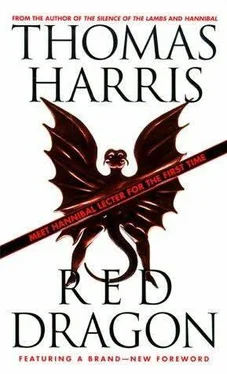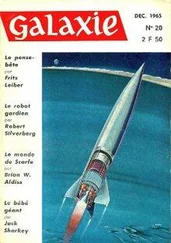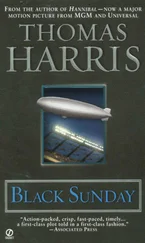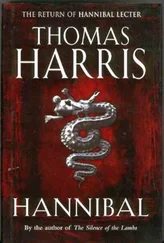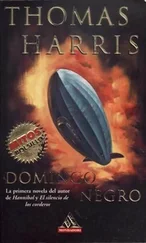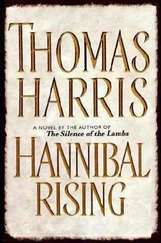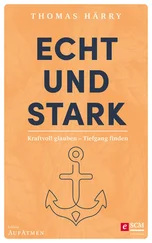"He was practicing psychiatry by that time. He had a nice office. Antiques. He said he didn't remember much about the arrow wound, that one of the victim's hunting buddies had brought him in, and that was it.
"Something bothered me, though. I thought it was something Lecter said, or something in the office. Crawford and I hashed it over. We checked the files, and Lecter had no record. I wanted some time in his office by myself, but we couldn't get a warrant. We had nothing to show. So I went back to see him.
"It was Sunday, he saw patients on Sunday. The building was empty except for a couple of people in his waiting room. He saw me right away. We were talking and he was making this polite effort to help me and I looked up at some very old medical books on the shelf above his head. And I knew it was him.
"When I looked at him again, maybe my face changed, I don't know. I knew it and he knew I knew it. I still couldn't think of the reason, though. I didn't trust it. I had to figure it out. So I mumbled something and got out of there, into the hall. There was a pay phone in the hall. I didn't want to stir him up until I had some help. I was talking to the police switchboard when he came out a service door behind me in his socks. I never heard him coming. I felt his breath was all, and then… there was the rest of it."
"How did you know, though?"
"I think it was maybe a week later in the hospital I finally figured it out. It was Wound Man - an illustration they used in a lot of the early medical books like the ones Lecter had. It shows different kinds of battle injuries, all in one figure. I had seen it in a survey course a pathologist was teaching at GWU. The sixth victim's position and his injuries were a close match to Wound Man. "
"Wound Man, you say? That's all you had?"
"Well, yeah. It was a coincidence that I had seen it. A piece of luck."
"That's some luck."
"If you don't believe me, what the fuck did you ask me for?"
"I didn't hear that."
"Good. I didn't mean to say it. That's the way it happened, though."
"Okay," Springfield said. "Okay. Thank you for telling me. I need to know things like that."
# # #
Parsons' description of the man in the alley and the information on the cat and the dog were possible indications of the killer's methods: it seemed likely that he scouted as a meter reader and felt compelled to hurt the victims' pets before he came to kill the family.
The immediate problem the police faced was whether or not to publicize their theory.
With the public aware of the danger signals and watching, police might get advance warning of the killer's next attack – but the killer probably followed the news too.
He might change his habits.
There was strong feeling in the police department that the slender leads should be kept secret except for a special bulletin to veterinarians and animal shelters throughout the Southeast asking for immediate reports on pet mutilations.
That meant not giving the public the best possible warning. It was a moral question, and the police were not comfortable with it.
They consulted Dr. Alan Bloom in Chicago. Dr. Bloom said that if the killer read a warning in the newspapers, he would probably change his method of casing a house. Dr. Bloom doubted that the man could stop attacking the pets, regardless of the risk. The psychiatrist told the police that they should by no means assume they had twenty-five days to work – the period before the next full moon on August 25.
On the morning of July 31, three hours after Parsons gave his description, a decision was reached in a telephone conference among Birmingham and Atlanta police and Crawford in Washington: they would send the private bulletin to veterinarians, canvass for three days in the neighborhood with the artist's sketch, then release the information to the news media.
For those three days Graham and the Atlanta detectives pounded the sidewalks showing the sketch to householders in the area of the Leeds home. There was only a suggestion of a face in the sketch, but they hoped to find someone who could improve it.
Graham's copy of the sketch grew soft around the edges from the sweat of his hands. Often it was difficult to get residents to answer the door. At night he lay in his room with powder on his heat rash, his mind circling the problem as though it were a hologram. He courted the feeling that precedes an idea. It would not come.
Meanwhile, there were four accidental injuries and one fatality in Atlanta as householders shot at relatives coming home late. Prowler calls multiplied and useless tips stacked up in the In baskets at police headquarters. Despair went around like the flu.
Crawford returned from Washington at the end of the third day and dropped in on Graham as he sat peeling off his wet socks.
"Hot work?"
"Grab a sketch in the morning and see," Graham said.
"No, it'll all be on the news tonight. Did you walk all day?"
"I can't drive through their yards."
"I didn't think anything would come of this canvass," Crawford said.
"Well, what the hell did you expect me to do?"
"The best you can, that's all." Crawford rose to leave. "Busywork's been a narcotic for me sometimes, especially after I quit the booze. For you too, I think."
Graham was angry. Crawford was right, of course.
Graham was a natural procrastinator, and he knew it. Long ago in school he had made up for it with speed. He was not in school now.
There was something else he could do, and he had known it for days. He could wait until he was driven to it by desperation in the last days before the full moon. Or he could do it now, while it might be of some use.
There was an opinion he wanted. A very strange view he needed to share; a mindset he had to recover after his warm round years in the Keys.
The reasons elacked like roller-coaster cogs pulling up to the first long plunge, and at the top, unaware that he clutched his belly, Graham said it aloud.
"I have to see Lecter."
Dr. Frederick Chilton, chief of staff at the Chesapeake State Hospital for the Criminally Insane, came around his desk to shake Will Graham's hand.
"Dr. Bloom called me yesterday, Mr. Graham – or should I call you Dr. Graham?"
"I'm not a doctor."
"I was delighted to hear from Dr. Bloom, we've known each other for years. Take that chair."
"We appreciate your help, Dr. Chilton."
"Frankly, I sometimes feel like Lecter's secretary rather than his keeper," Chilton said. "The volume of his mail alone is a nuisance. I think among some researchers it's considered chic to correspond with him – I've seen his letters framed in psychology departments – and for a while it seemed that every Ph.D. candidate in the field wanted to interview him. Glad to cooperate with you, of course, and Dr. Bloom."
"I need to see Dr. Lecter in as much privacy as possible," Graham said. "I may need to see him again or telephone him after today."
Chilton nodded. "To begin with, Dr. Lecter will stay in his room. That is absolutely the only place where he is not put in restraints. One wall of his room is a double barrier which opens on the hall. I'll have a chair put there, and screens if you like.
"I must ask you not to pass him any objects whatever, other than paper free of clips or staples. No ring binders, pencils, or pens. He has his own felt-tipped pens."
"I might have to show him some material that could stimulate him," Graham said.
"You can show him what you like as long as it's on soft paper. Pass him documents through the sliding food tray. Don't hand anything through the barrier and do not accept anything he might extend through the barrier. He can return papers in the food tray. I insist on that. Dr. Bloom and Mr. Crawford assured me that you would cooperate on procedure."
Читать дальше
